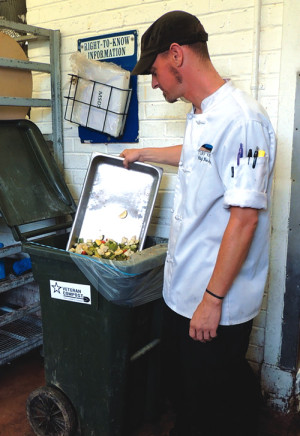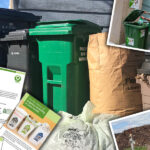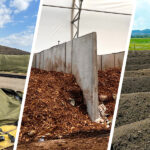BioCycle August 2014
Ellicott City, Maryland: BioCycle Chooses Top Sustainability Hotel For 2014
East Coast Conference

Turf Valley Resort has implemented initiatives in energy efficiency; water conservation; food purchasing; and waste reduction and uses Veteran Compost for their food waste/organic residuals.
In October, BioCycle East Coast Conference 2014 will be held at the Turf Valley Resort, in Ellicott City, Maryland, October 27-30. As a resort hotel located in the metro Baltimore-Washington, DC corridor with 36 holes of Championship Golf and 40,000 square feet of meeting space, Turf Valley has been making strides in its environmental performance since the advent of their Environmental Team in 2009. The team has implemented initiatives in energy efficiency; water conservation; food purchasing; and waste reduction.
A major area where Turf Valley has made an impact is reducing waste sent to the landfill. Since 2009, the resort has been diverting its organic waste. In 2011, the resort entered into a contract with Veteran Compost, an organics hauler/composter based in Aberdeen, Maryland (See “War Veteran Succeeds on the Composting Front” December 2013). “Turf Valley uses 32- and 64-gallon collection bins — the larger bins being for the hotel restaurant and the smaller bins for the banquet kitchen and facilities,” explains Justen Garrity, president of Veteran Compost. “The bins are wheeled outdoors to a central location, and we service them two times per week. Turf Valley averages between 2,000 to 3,000 lbs of food scraps each week, but given the nature of golf and banquet facilities, that volume can be much higher during certain times of the year.”
Montpelier, Vermont: Interactive Materials Management Map
In 2012, Vermont passed the Universal Recycling law that bans all food scraps from landfills by July 1, 2020 (See “Rolling Out a Statewide Organics Ban”). The largest generators of food scraps (> 2 tons/week) were mandated to divert their organics effective July 1, 2014, if a certified processing facility is located within 20 miles. Additionally, blue-bin recyclables (like metal, glass, plastics #1-7) are banned from the landfill as of July 1, 2015; and leaf, yard, and clean wood debris by July 1, 2016.
To assist with implementation of these mandates, the Vermont Agency of Natural Resources (ANR) developed the “Universal Recycling Materials Management Map.” The online tool “allows users [i.e. residents, businesses, and institutions] to find facilities that accept various materials for food rescue, recycling, composting and disposal, such as food shelves, transfer stations and composting facilities.” The Materials Management Map also displays food scraps generators like supermarkets or restaurants, in an effort to connect food rescue agencies, haulers or processors with sources of quality food and food scraps. In addition, the map lists local governments, known as Solid Waste Management Entities, which can provide composting and recycling guidance to businesses and institutions at the local and regional level. The initial focus of the Materials Management Map is on organics management, so only transfer stations and recycling stations that accept leaf and yard debris and/or food scraps are currently listed, but as the map continues to be updated, it will reflect all solid waste facilities in Vermont. Map Tutorial
Salem, Massachusetts: Grocery Store Prepares For State Organics Ban
On October 1, 2014 when the state of Massachusetts’ ban on commercial organics disposal by generators producing >1 ton/week takes effect, Crosby’s Marketplace, a Salem-based supermarket chain with six stores, will be ready. Since late last year, Crosby’s has been source separating about 1.5 tons of food waste (meat and produce waste) weekly at each of its stores in Hamilton, Georgetown and Concord, according to General Manager Bob Vello. Edible food is donated to area homeless shelters. Three other stores will be added by October 1. Currently, food scraps recycling has enabled Crosby’s to reduce its refuse pickups from three to two times/week, saving about $150/week/store. Velo’s goal is to eliminate the trash compactors at the stores, he says.
Employees collect food scraps in 5-gallon plastic pails, which are emptied into 64-gallon wheeled carts. Collection for the Hamilton store is done by Gloucester (MA)-based Black Earth Compost, which has been picking up food scraps three times a week. Black Earth composts the organics on land it leases at Mehaffey Farm in Rowley, Massachusetts. (Organics from the other two stores is collected by Crosby’s designated hauler, Waste Management, and composted by two other composters.) This spring, the Hamilton store began selling its compost in 5 cubic-foot bags priced at $8.99 each. Sales have been brisk, notes Vello.
Black Earth started about 3-and-a-half years ago as a hauling business. “We quickly saw that the barrels of food waste were too heavy to lift, so a friend and I built a side-loading hydraulic lift for the dump truck,” recalls co-owner Conor Miller, who has two other partners. Since then, Miller and partner Andrew Brousseau have been building their own equipment “to save dramatically on costs, suit our specific needs, and have fun building things,” he adds.
Black Earth now leases plots of land (each about 1 acre in size) at a total of four farms, mixing food scraps with wood shavings and horse manure supplied by the farmers. In exchange, each farmer receives half of the compost produced. The food scraps, manure and wood shavings are typically arranged in two windrows, each about 200 feet in length, on a bed of compacted earth at each farm. Black Earth uses a combination of aeration and turning to compost the material, which takes about three months. Brousseau built solar-powered blowers to aerate each pile. After six months of curing, the compost is screened to quarter-inch and one-inch sizes. At the Mehaffey Farm in Rowley, a hoop house was built to house the windrows during the winter. Black Earth ran steel tubing through a pile of the compost laying against the concrete wall of the hoop house for supplemental heat. “We were getting 110°F air coming through in winter,” notes Miller.
Richmond, Virginia: Organics Hauler Achieves B Corp Certification
In June, Natural Organic Process Enterprises (NOPE), a commercial organics hauler based in Richmond, became the first organics recycling collection service in the nation to achieve B Corp certification. B Corp certification is a third party assessment carried out by the nonprofit organization B Lab, which evaluates companies using a number of criterion on their ability to solve social and environmental issues. NOPE’s stated mission is to “make central and eastern Virginia more sustainable by providing the option for full service composting.” Its goal is to assist companies and institutions with incorporating organics recycling into their greater sustainability initiatives. As of now, NOPE only does commercial collection (including institutions like schools and hospitals) but is pursuing plans to pilot a residential collection program in the near future.
Recently, NOPE began a “Compost Credit Program,” which enables the generators they work with to accrue ‘Compost Credits’ over time, which they can either use themselves for gardening or landscaping, or donate to another party that will put the soil amendment to good use. For every 2,000 lbs. of compostable material that NOPE collects from a generator, one ‘Compost Credit’ worth 40 lbs. of finished compost is issued. Already, the program has been successful at helping jump start two different community gardens in the Richmond area. More information on NOPE’s B Corp status and their Compost Credit program at www.nopeva.com.
St. Paul, Minnesota: Organics Recycling Legislation
During the 2014 Minnesota legislative session, Representative Frank Hornstein and Senator John Marty sponsored recycling legislation that will boost diversion rates of both blue-bin recyclables and organics. Specifics of the legislation include: As of January 1, 2015, sports facilities are required to recycle materials such as (but not limited to) paper, glass, plastic and metals; By 2030, each metro area county (of the Twin Cities region) must recycle 75 percent of its municipal solid waste; the Minnesota Pollution Control Agency’s (MPCA) recycling goals in the metro area have been increased to 75 percent, and to 60 percent for the rest of the state; Any owner of commercial properties within the metro area that contracts for weekly collection of at least 4 cubic yards of solid waste is mandated to recycle at least three materials (i.e. paper, glass, plastic, etc).
Stipulations of the new legislation that pertain to organics recycling include making 50 percent of the appropriations from MPCA’s Environmental Fund available for organics recycling. The total fund available is $4 million in FY 2015 and $3 million in FY 2016. The 50 percent carve-out for organics must be spent on “composting source-separated compostable materials” (SSCM), and includes provisions for residential receptacles for SSCM. In addition, the definition of “total solid waste generation” now includes SSCM.













